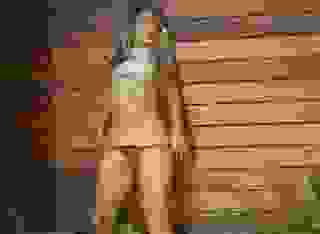Note: You can change font size, font face, and turn on dark mode by clicking the "A" icon tab in the Story Info Box.
You can temporarily switch back to a Classic Literotica® experience during our ongoing public Beta testing. Please consider leaving feedback on issues you experience or suggest improvements.
Click hereShe got that.
"Anyway, I'm not, like, an expert? But, seems to me all the focus on the ISS was about making it super-light, and optimized this way or that, and, just kinda seemed, we could do better than that, with some heavy lift capability."
"And you want...?"
"Well, I like the idea of just doing it, and fixing problems as they come up. So, maybe, if someone wanted to weld together something, maybe, put it on the runway at Nasa Ames or wherever. I'd move it. Probably chunks of less than 100 meters diameter. Whatever orbit you want."
"100... meters?"
"Yes. And, yes, that's about the size of a light aircraft carrier or the USS Iowa. So, I'm serious, I want it fast, and simple, and very, very safe. Doesn't have to be light."
"Is there any reason you're...?"
"Mankind deserves better than being trapped on Earth. I have this sweet ride to help fix some problems, I'm going to do that. I liked the fact that the Azores get to do it first, if they can, so even if you're fast, they get first dibs for me."
The idea that I was being this nice to the Azores was confusing to her, I could see, but I let it go. I wanted to help them out.
She brought up some ideas, asked me some other things, and that was the call.
We had started a long process with the government, I had a feeling. It was like I had a box-truck that could drive up a mountain that no one else could drive up.
== CHAPTER: Doing the World a Solid ==
A couple of hours later, I was sitting at the conference table with 6 of the girls... women, really... They were making calls on assigned tasks like creating some telescopes for us to fly up. The rest of us were trying to spitball ideas for solving the energy problem, global warming demanded it.
"Pat. What are the limits to the technology you can transfer to me, or to mankind?"
Pat replied with the typical flat-toned unimaginative fact-based responses I'd expected. "Ethically I cannot transfer tech that would lead to military conquest. I cannot cause deaths for almost any reason. If some action must occur to save a great many people, but some current deaths must happen, this will cause great pain to you and the crew from enhanced ethical empathy."
This was news to me. We'd never talked about it that much.
"Is there any tech you could reveal or suggest, that would be of a small incremental nature, that would allow cheap widespread generation of electrical power?"
"The photovoltaic silicon feedstock you have isolated will solve this problem."
I'd been reading, and our group had been talking, including to some Sierra club people. "Pat, we don't have machines that turn that silicon into actual solar cells. Plus, we don't have inverters to sell, either, so DC power won't help all of them. Can we make inverters?"
"We can make several machines onboard but they won't solve the problem of inverters for all of the Earth. For that, human factories will be required."
"What about converting silicon wafers into PV cells? That takes machines... Is there a faster machine design, that could be built by humans more easily?"
"There are many designs that would be far more simple than the current methods."
"Like?"
"Here are the relevant technologies."
On the wall, the screens showed several, which after some querying, resolved into cartoon-simplified drawings of screen printing of connections and contacts made of gold onto the silicon.
"Could we do this? Could this ship build machines that would create solar panels, say, one meter square, with all required contacts, that would make 300 volts DC? Up here?"
"Yes. Such machines would require about 4 days to fabricate. The technology would need to stay in high orbit."
"How long would it take to process the silicon we have into PV panels?"
"Approximately 10 days after the machines are built."
"So, you're saying, two weeks from now, we could create enough solar panels to... how much power would this generate?"
"During the local daytime, it would exceed all known power sources on Earth by approximately 1200 times."
There was no other response. My mind was saying it, but Alice said it out loud: "Oh My God!"
Beth spoke up, her Ukrainian accent coming through very clearly. She said loudly, "Lets. Do. That."
"Pat, please identify impediments to mass production, distribution, and usage of such panels by the human population."
"Inverters will require fabrication. Linking inverters to make household supplies. Battery storage to retain power for nighttime use. Grid connection electronics for developed countries. Production of electrical cabling to enable this. Materials for above components including copper."
"Where can we get copper?"
"We have sufficient copper in one of the spheres we returned with from Mercury. However, as more is needed, additional supplies are available in large deposits on many planets and moons in this system. Much more was on Mercury, we just limited the amounts we returned with."
"Pat, please detail steps required for us to make money selling complete PV electrical and battery systems for residential and commercial use across all human populations on Earth."
The only words that appeared on the wall-screen were, "1. Business licenses from governments. 2. One additional lunar visit. 3. Instruct me to start production."
We all laughed. I said, "Pat, start production."
"Do you wish to depart for the moon immediately?"
"Yes."
We took off, accelerating forwards in orbit, the way to raise the orbit was to go forwards (counterintuitively).
I stood up and stretched.
Lara switched the topic and asked, "Pat, are there technologies you would recommend that would protect biodiversity, safeguard the environment, that kind of thing?"
Pat displayed a large list of items as a connected set of nodes with arrows, showing dependencies both ecological and financial, and then substituting in replacements of artificial but pure/enhanced-nutrition meats, fish, dairy, grains; replacing lumber with metals; transportation methods, pandemics among farm animals, all sorts of stuff appeared.
Lara continued, speaking carefully and reading from notes she'd written. "Pat. Please identify low hanging fruit - easy tasks for us - that would achieve the most benefits to protect mankind from pandemic, ecological loss, ensure a high quality diverse food supply, economic growth, and enable stable healthy population growth? Factor in devices that we could either release to the public or construct ourselves without dangerous technology transfer."
The graph rearranged, and rearranged. I had never known Pat to _not_ have an answer instantly, but this one required many rearrangements. Some circles appeared and disappeared, others turned red or green, lines appeared between them that turned into circles with red 'feedback' labels and then disappeared.
This went on for several minutes. I didn't want to interrupt, none of us did. I could understand some of what was being considered, but not all of it.
Finally, the graph settled down, nodes and lines between nodes turned green, and we looked at the result.
Settlements in space - free-floating, on asteroids, or on planets - that reasonably mimic Earth biospheres.
Incentives for frequent international migrations to reduce racism and violent nationalism.
Underground settlements similar to space-based ones, preserving surface space for existing biosphere use.
Safe, tasty, nutritious, and inexpensive meat, fish, and grains, first from plant sources and later from pure chemical ones.
Large-scale freshwater storage to combat droughts.
Automated enclosed hydroponic farms.
Large scale artificial protected reef ecosystems.
Inexpensive, reusable, and reliable space transport not dependent on Bison.
Incentives for larger family sizes to fight demographic collapse and fill new habitats.
Ban development on all artificial general intelligence, including the death penalty for transgressions - the 'Largest Single Threat' (Pat's capitalization).
We sat and digested this list for a few minutes. Someone said something, but Beth said, "Wait, ssshhh, I want to re-read this 3 or 4 times."
I wasn't going to disagree with Beth.
Finally, she asked, "Pat, what's the deal with 'space transport'? You want us to do some kind of rockets that you lift up? Are you going to give us tech from Bison?"
"No. Tech must be human. Bison's tech would reveal basic physics that could immediately wipe Earth from existence."
We all kind of sat there, stunned, but on the other hand, it kind of made sense. If Pat could heat a spherical kilometer of rock as easily as we'd seen it, YES, there were military dual-uses.
Lara, who'd asked about ecology earlier to prompt this whole thing, asked, "Pat, these seem to be talking about underground places to live. Every time I've heard about tunneling, it's super, super dangerous and expensive."
Pat replied, "You have technology already that can solve this. It has not yet been used for the purposes of digging."
"Elaborate?"
"Several technologies exist that use extreme amounts of electrical power but are highly reliable, broadly usable, and simplistic. First, a highly focused microwave laser tuned to frequencies of water. Aim at the rock face. Dry rock can be cut with a commercially available water-knife to speed this process. Trapped water flashes to steam, fracturing and spalling it. Then, a further set of x-ray lasers tuned to quartz frequencies can partially melt rock to a depth of 2 meters, solidifying it and preventing cave-ins."
"How hard are these to make? Who makes them?"
"Several companies, listed on screen, and experts are also listed."
"Pat, call the top expert in masers you have there... Dr. Shoe?"
"Dr. Shoe's CV indicates she only speaks Mandarin. I have asked Anna to come in here."
Anna showed up a moment later. We explained what we wanted and connected the call. It was the middle of the night.
A very confused woman answered the phone and Anna spoke with her. The "shoe" transliteration was better described as "Szshhoo" and I knew I'd not pronounce it right.
Anna asked her if she'd like some funding to work on masers, for us. She said no until Anna explained where the call was coming from. I whispered to Anna, "Tell her we can give her a sightseeing trip to the Moon as a bonus."
The phone went silent for a little bit, and she came on again and said, in perfect English, "What kind of game is this? Are you really Kevin Cooper?"
I smiled. She'd known English all along. "Ma'am, uh, Doctor-ma'am, yes, I am. I'm sorry for calling so late in your time zone. I'm not quite used to this world-travel thing."
"Yes, yes. We know this. You are supposed to be a high school student. I don't think I believe that. How do I know you're not an alien?"
I laughed. "Well, you don't. I don't feel like an alien. If you ask my girlfriend... girlfriends, they don't think I'm an alien, I don't think. So, probably not. If we were bad aliens, we probably wouldn't be asking for your help on masers."
"If you're using this giant spaceship, why can't you just get all the alien tech there? What do you need me for?"
"Can't use alien tech on Earth. Can't tell humans about alien tech. I can use it to fly the ship, maybe make some stuff, but I can't transfer tech that's too advanced. More than that... Well, It's complicated. Can I come and pick you up, maybe, you can see the ship and make up your mind yourself?"
"I am an old lady. You only fly with little girls."
"You will be welcome here. Maybe these girls could use some straightening up." I winked at the girls at the table and they laughed quietly.
"Fine. Come pick me up. Where should I go? I live in a big apartment building."
"We're on the way to the Moon, we'll be back tomorrow. Pack a bag for a week. Who has the best maser equipment, laboratories, in the world?"
"Mine. Well... no, not really. My government would want me to say, Beijing. Correct answer, University of Utrecht, Netherlands. They have more money than my lab."
I got to business. "Can we send you a plane ticket? I am nervous about landing in China for political reasons."
There was a pause. "South Korea would be easier. Or, some field outside of a city."
We negotiated, got the lawyers on the phone, and had the U.S. State Department on the call in a couple of minutes. They committed to granting a scientific priority work visa to Dr. Shoe if and when she arrived in the USA.
I thought it'd be better to have a conference, and get the leading people in a room at the same time. That meant hiring people, and finding them, and that was too much to do all at once.
The best choice was to empower Anna to convene all the best people in Hawaii for a 'General Technical Conference', and decide who needed to be there. She went off to the storeroom with Tina to work the problem.
The lawyers had said they needed to chat, so I called them back.
We had $1.3 billion in various bank accounts, they said, largely from NASA payments for clearing low earth orbit objects and directly authorized for quick payment by the President.
It just made me wonder how long the normal payment process was and the lawyers laughed.
The older lawyer said government payment schedules usually required a tarot deck and came out in units of random geologic durations.
I laughed huge at that.
The amount of small crap they wanted to ask me was irritating but I saw the reason why. They had to have a board of directors for various companies I was creating, and CEOs, and employees, etc.
I told them to randomly assign my crew to the CEO jobs but hire good people for the rest of the positions.
About that time we were approaching the Moon and I had to ring off. It was time to go prospecting again.
Pat had mapped a location of interest on the far side, so we came over and landed again, the second Moon visit Mads and I had had, but a screaming great excitement generator for the rest of the crew.
Pulling up on dirt with a succession of spheres, we created a tunnel down to our lode.
What Pat was after was a deeply-buried set of ores, melted together from some super-ancient process, with molybdenum and some other less-common elements.
After the tunnel downwards was created and the walls sealed with high enough temperatures to melt the rock and make a solid tube, up floated ore, which then was spun at high speed in spheres that surrounded the ship.
We were there 2 full days, and while we mostly focused on the spheres of metal arrayed on the surface near us, large rectangular boxes about the size of the cargo bay appeared below us.
No view was available from the cargo hold, and the door there was probably locked, not that I'd want to breathe vacuum or whatever was in there.
The boxes added up to nearly the size of our ship as they were stacked.
We thought that would be it, but Pat started on another.
The third one appeared, and then all 3 lifted off and were thrown into orbit.
Eventually, we lifted off to follow them, bringing more spheres of almost 1 km diameter each back with us. Each was of a pure metal - molybdenum, titanium, chromium, and copper, and a last one of slag with some other 'valuable stuff' we might need.
We took off again, heading back for earth orbit.
Of course, the factories Pat had created appeared ahead of us, tied together by a framework. Once we got there, a process started where Pat sliced up the pure silicon sphere into thin, 1 meter-diameter squares and loaded them into a hopper that could be fed into one end of the rectangular doodad.
I didn't need to know how it worked. Pat insisted it was all man-made tech, just with some small differences for orbit, and it quickly started accumulating finished solar panels.
This could run automatically, so we dipped down and went to our conference.
The businesses we were starting were taking full-time for my crew. They were spending most of the day on their cellphones, and I was getting less and less time for sex.
All work and no play makes Kevin a horny boy.
Mads, Alice, Ella, and all the others helped, but sometimes the person who was next on the list was busy.
I found I was wanting to have sex or do something about every 2 or 3 hours, which seems like a lot, but I was just bubbling with wow, seeing all these gorgeous girls walking around me, frequently without anything on.
What's a guy to do!?!?
I did laugh at myself, though. I knew my libido had been turned up to 11, but as a pastime, it's pretty damn nice.
One of the perks that I didn't expect was helping people with problems. Two of the girls hated their hair, saying it was too fine and they couldn't control it easily. Ella complained that her boobs were way, way, way too big, and could we do anything?
Pat replied yes and gave her options, complete with lifelike pictures of what the result would look like. Ella chose one and was told it would take 3 weeks but wouldn't hurt. She was so happy she kissed me again, which of course was enhanced by the pleasant feeling of soft boobs pressing into my stomach.
== CHAPTER: Reorganization ==
With so many ideas going at the same time, I was asking more and more questions about how I could help the world, and letting several girls go so they could manage projects and coordinate people, meant I really needed to have more crew onboard.
With some help from Mads and Willa, we chose 20 more girls to come onboard, mostly from the USA, but some from Germany, Japan, China, and India.
The FAA issued us a 'tail number' and a flight worthiness certificate from demonstrated capability, which combined with reasonable fame allowed us to drop into almost anyone's airspace, which I made a habit of doing from 30k meters (90,000 feet) over a well-traveled route so we seemed like a more normal aircraft.
To keep things on an even footing and prevent problems with their families, we picked them up from private airfields instead of just dropping onto a soccer field here or there.
One girl, from France, Pat said, could not come aboard. Her family was being threatened by a drug cartel and her joining our crew would have placed both them and her in danger. We reported the whole thing to the police, but it was too complicated and we ended up missing out on her.
Secondarily, another girl couldn't come because it turned out she was actively sick with a slow-growing cancer and was already in trouble. Pat said she would have been able to help her, but human medicines could also do so and she would be ill for a month at least, and we needed people sooner than that.
One face was familiar - Dr. Shoe!
Of course, being older (54 years old), she had some gray hair. That said, Pat assured me that within 2 weeks she would regain much of her cellular youth and would live a nice long life.
We'd had her come aboard, so we could 'ask questions'. Really, though, Pat suggested that we change out some crew and have some temporary crew, so Pat could 'guide' them.
I knew from my own experience this meant having images and ideas appear in my head, and had benefited from Pat's ability to show me how parts interacted in existing systems.
Pat had done this for the other girls, and for Dr. Shoe it would let her explore possibilities faster than talking over a phone. Pat also told me about giving Dr. Shoe some 'clues'.
Later, reviewing her work, Pat pointed at these as simplistic inevitable enhancements.
With more people, we needed more space.
Another bunk room next to the first one added sleeping space, as well as a pair of triple-high queen-size bunk beds in my stateroom. This meant that I had some choice in the middle of the night.
More than that, we got some conference/phone rooms, a relaxation room (couches and 'TV' that could get any channel or anything recorded, ever), and an institutional-sized kitchen. Those filled out the rest of the floor area on the top level of the Bison. We had one more whole floor to use if we wanted to, but at that point Pat was using it for 'storage' and said it would be available, 'when needed'.








